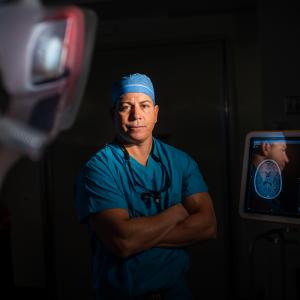The actor, dancer, and Broadway performer reflects on his journey from being the picture of perfect health to grappling with the news of having a brain tumor.

Cowperthwaite in November 2023 recovering from his craniotomy.
CREDIT: BARTON COWPERTHWAITE
After a series of inexplicable seizures in late 2023, the actor Barton Cowperthwaite, known for his role in Netflix’s Tiny Pretty Things, was diagnosed with an oligodendroglioma, a slow-growing brain tumor that is a kind of glioma. Oligodendrogliomas are rare—accounting for around 1,100 of new brain tumors diagnosed in the United States each year—and occur most often in men between the ages of 20 and 40. The seizures Cowperthwaite experienced are one of the condition’s hallmark symptoms.
The classically trained ballet dancer chose NYU Langone for his treatment after consulting with several New York City doctors and hospitals. On November 21, 2023, John G. Golfinos, MD, co-director of the Brain and Spine Tumor Center at NYU Langone’s Perlmutter Cancer Center; Daniel A. Orringer, MD; and their neurosurgical team performed a delicate five-hour surgery to remove a malignant, lemon-sized mass from Cowperthwaite’s right frontal lobe. “One of the reasons we decided to go with NYU Langone is the intraoperative MRI technology, and it ended up saving the day,” says Cowperthwaite.
“At a certain point Dr. Golfinos and Dr. Orringer came out and told my family, ‘We’re 99.5 percent sure that we got the whole thing. He’s just in the intraoperative MRI right now.’ But the MRI revealed that there was a tiny piece of tumor hiding under a burst blood vessel. Dr. Golfinos—who was on his way home—came back, scrubbed back in, and removed the rest of the tumor.”
Nearly three weeks later, the doctors performed a second surgery to address an infection.
Today, six months after those surgeries, Cowperthwaite is planning a June wedding to his fiancée, Sophie, and performing eight times a week in the musical The Outsiders on Broadway. Now back at 100 percent, the 31-year-old reflects on some of the lessons he learned about living through the onset of a sudden and serious illness.
Lesson No. 1: Don’t Go It Alone
“My career has been spent primarily as a classical ballet dancer, and more recently I moved into acting. When the seizures started, it was really confusing. I’ve been the epitome of health my entire life. I’m not someone who even goes to the doctor, so I’m not practiced at asking health-related questions. I was extremely fortunate to have a partner who has better instincts when it comes to asking those important questions.”
Lesson No. 2: Be Positive—and Stay Away from Google
“After [I chose NYU Langone for my treatment], I had a week and a half to wrap my head around the fact that I was going to get brain surgery. That said, I’m naturally optimistic—even after I was told I had a tumor. Being able to lean on Sophie, her parents, and my family allowed me to go into an intense day with confidence, feeling strongly that I was going to be OK. I also found it extremely valuable for my mental health to stay away from Google.”
Lesson No. 3: Hurrying Doesn’t Always Get You There Faster
“I’ve had this hunger to be an active person my entire life. To have something that required me to stop and be still was shocking. After the first surgery, I was eager to come back as quickly as possible. But then I had an infection and needed a second surgery. And that’s when I was like, OK, here’s the lesson: Sit, and be patient. Don’t push too hard.
After the second surgery, I was doing IV antibiotics at home and would sit, read, and visualize my body healing and getting rid of the infection. It occurred to me that hurrying doesn’t always get you there faster. And patience is not something that you learn and then have mastery over. It’s like a muscle; you have to exercise it.”
Lesson No. 4: Find the Gift Inside of the Difficulty
“Unwelcome news can end up turning into something good. I would say that there’s usually, if not always, a gift inside of the difficulty. But it’s not always obvious; you may have to really search for it.
It’s easy to take something at face value and say, ‘Oh, I’ve been diagnosed with this horrible thing,’ and focus on that. But I very much found a silver lining sharing my journey online openly and honestly. The outpouring of love and support has been tremendous and overwhelmingly helpful.”


